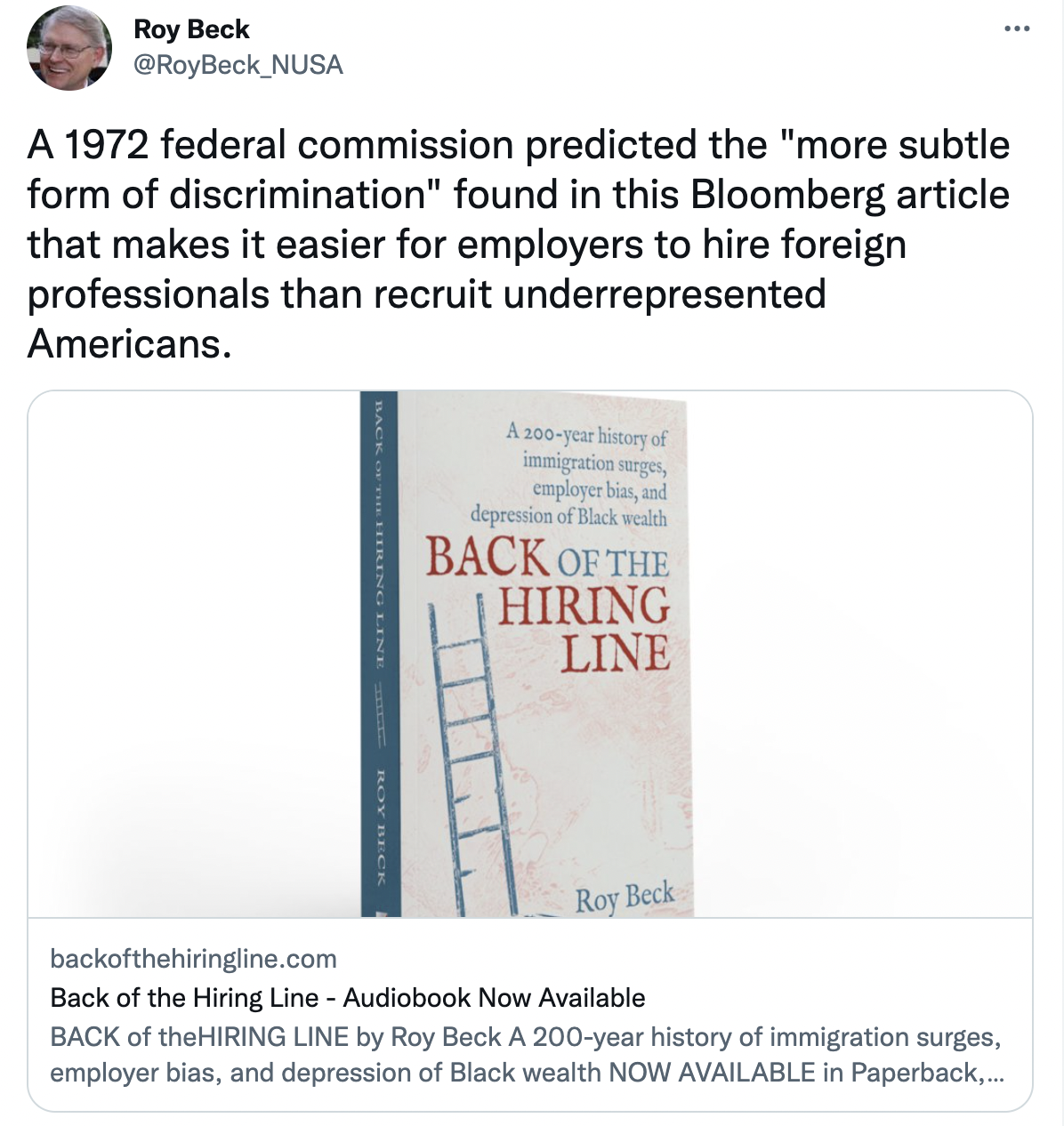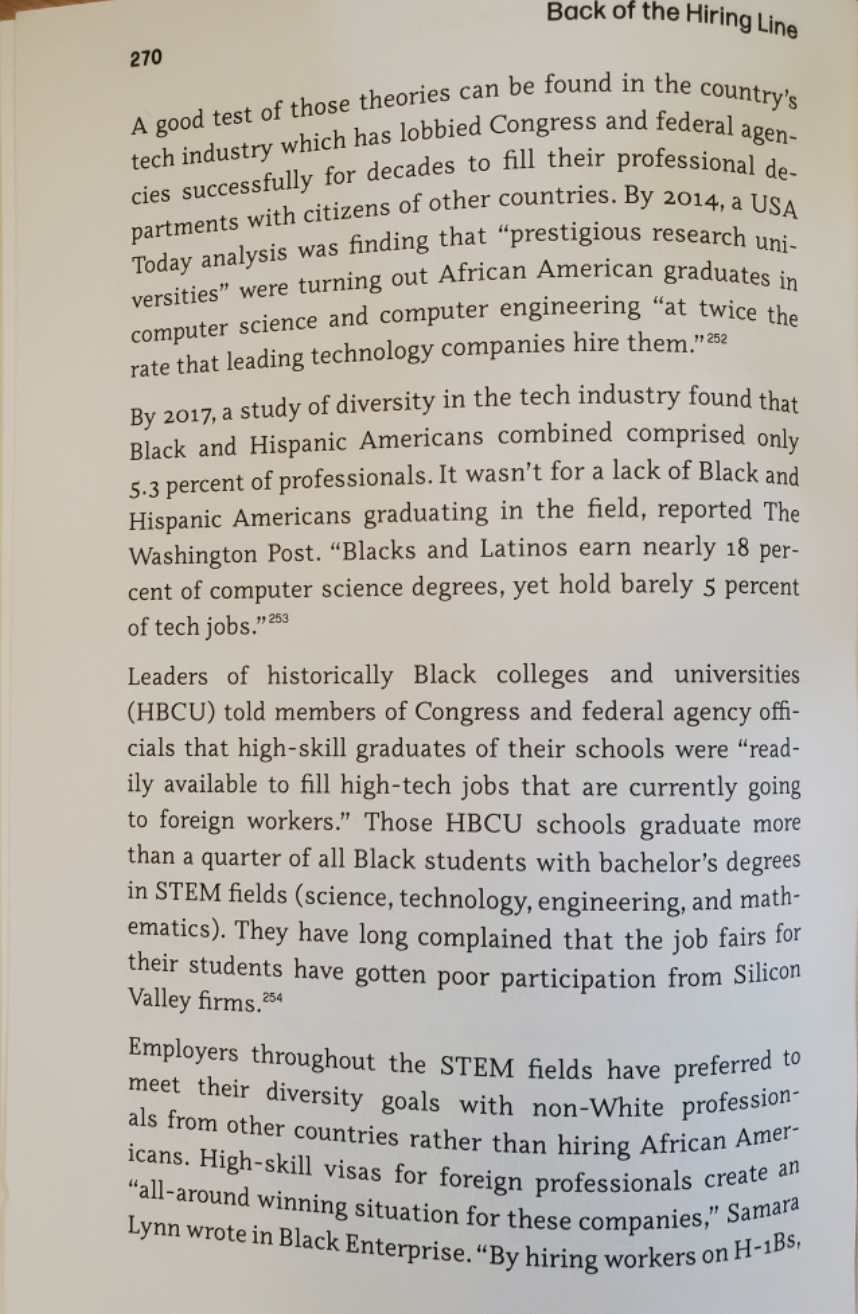In “Biden Is Caught Between Big Tech and Black Voters,” Rachel Rosenthal analyzes and provides ample data about the limited opportunities for Black Americans in tech.
“HBCUs, community colleges and other minority-serving institutions have been ignored at both ends,” Rosenthal reports. “As a result, many Black computer science and engineering graduates have ended up working everywhere but Silicon Valley, the lucrative epicenter of tech innovation — even as industry giants there say they can’t find any Black workers to hire.”
Rosenthal details several cases where major tech companies have been caught bypassing domestic talent in favor of cheaper foreign labor, which is what our visa programs were written to do (it is legal to hire a foreign worker “even when a qualified U.S. worker wants the job, and a U.S. worker can be displaced from the job in favor of the foreign worker.”). The poor record of these companies in terms of hiring from places like Historically Black Colleges and Universities (HBCUs) has been “decades in the making,” Rosenthal writes.
In a May 2000 congressional hearing on the impact of H-1B visas on American workers, John W. Templeton, author of an annual report called “Silicon Ceiling: Equal Opportunity in High Technology,” said: ‘We started to look at the issue of fair employment in high technology, and it did not take us long to intersect with the H-1B.’ One employer reportedly explained the lack of hiring from HBCUs and black professional organizations as a matter of convenience: ‘The H-1B is easier, I need the body count,’ according to Templeton’s recounting.
“This backdrop is a reminder that the diversity equation in tech is different than in other sectors. Although a steady flow of international hires might seem to check the right boxes, 64% of H-1B petitions approved in the 2021 fiscal year were filed on behalf of Indian or Chinese men. ‘Many [foreign-born workers] are counted as underrepresented minorities [to] help fill open gaps in the STEM workforce but do not serve to increase domestic ‘minority’ representation in STEM,’ according to a National Academies of Sciences, Engineering and Medicine report from 2019.”
Emphasis mine. If anything, Rosenthal underestimates how far back the histories of these policies reach.

Back of the Hiring Line is primarily focused on the effects the last 200 years of immigration policy has had on Americans with less than a college education, but Chapter 24 in particular touches on the very real impact white-collar immigration has on college-educated Americans.

Two serious ethical questions raised by 1972 federal commission remain today, suggests Hiring Line‘s author: (1) What are the brain-drain effects of a wealthy United States enticing away the highly-educated of underdeveloped countries which have a greater need for their services, and (2) What is justification for using immigration to fill professional jobs when descendants of American slavery remain so under-represented in those fields?
Cheap labor policies can be a means to growing the overall economy, but what’s the point if it does more harm than good to the members of our national community? Michael Lind weighs in:
“In the case of globalization, multinationals like Apple, automobile companies, retailers like Walmart, and the investment banks that backed these corporations or bought and sold them, all benefited from “global labor arbitrage”—replacing highly paid, often unionized workers in the United States with poorly paid workers with few or no labor or civil rights in Mexico, China, and other countries. Boosting corporate profit margins by slashing labor costs is much easier than skill-training your workforce and investing in innovative technology in order to increase per-worker productivity: Given a choice, companies tend to take the low road of replacing high-wage American labor with low-wage foreign labor, even if this means the loss of entire industries and supply chains.“
Emphasis mine. It’s hard to blame companies for taking the path of least resistance, or the foreign workers for seeking new opportunities. They are acting in their own best interests and at the invitation of Congress. The public policy question is what kind of immigration system is in the best interest of American workers and their families, including the immigrants who arrived yesterday.
JEREMY BECK is a V.P., Deputy Director for NumbersUSA
Take Action
Your voice counts! Let your Member of Congress know where you stand on immigration issues through the Action Board. Not a NumbersUSA member? Sign up here to get started.
Donate Today!
NumbersUSA is a non-profit, non-partisan organization that relies on your donations to works toward sensible immigration policies. NumbersUSA Education & Research Foundation is recognized by America's Best Charities as one of the top 3% of well-run charities.
Immigration Grade Cards
NumbersUSA provides the only comprehensive immigration grade cards. See how your member of Congress’ rates and find grades going back to the 104th Congress (1995-97).